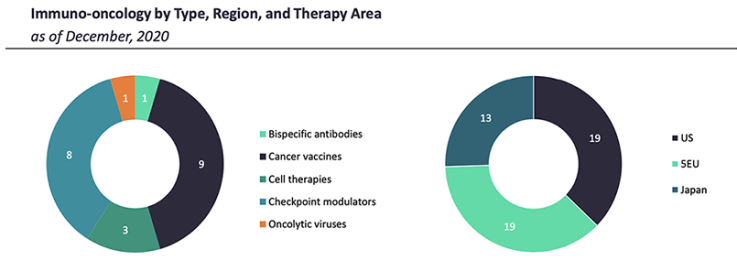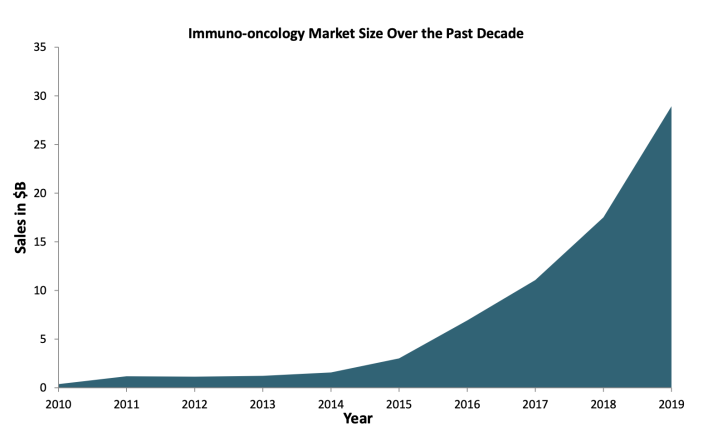
POSTED BY
John Swift
Top Trends in Immuno-oncology
Immuno-oncology uses pharmaceutical products or biologics to stimulate a patient’s own immune system, helping it recognise and attack cancer cells.
Immuno-oncology has changed the therapeutic landscape forever and continues to benefit many cancer patients. It is a thriving field – with a range of new trends, innovations, challenges and developments.
There are five main areas where significant advancement is being made.
- Bispecific antibodies
- Cancer vaccines
- Cell therapies
- Checkpoint modulators
- Oncolytic viruses

Bispecific Antibodies
So far, bispecific antibodies have offered a raft of new options for when traditional therapies fail.
An increasing number of recent studies show bispecific antibodies targeting checkpoint molecules.
One of the key trends has been in translating the success of bispecifics in blood malignancies into solid tumours.
84% of high-prescribers surveyed by GlobalData use bispecific antibodies as part of their regular practice or as part of clinical trials. GlobalData’s research also shows many influential practitioners see bispecific T-cell engagers as a great combination partner for checkpoint modulators and other IO therapies.
Cancer Vaccines
Although Cancer Vaccines attract some industry Interest, it is currently less clear what the most promising future directions will be.
There have been some concerns over single-agent efficacy, which have caused a shift in vaccine studies towards less-demanding lines of therapy, such as adjuvants.
Some Cancer Vaccines based on mRNA are expected to make a comeback after the success of mRNA vaccines in the treatment of COVID-19.
New studies show that simple peptide vaccines are ideal as well-tolerated maintenance regimens.
Cancer Vaccines can be used to prime the immune system for a more potent combination partner to more fully elicit anti-tumour responses.
According to GlobalData research, 53% of high-prescribers have used cancer vaccines as part of their regular practice or as part of clinical trials, but only 18% believe that a combination of a cancer vaccine with a checkpoint modulator is the most promising approach in their field.
Cell Therapies
The Cell Therapy field Is constantly expanding, but there is still a need for improved academic expertise and manufacturing.
Yescarta (Gilead), Tecartus (Gilead), Breyanzi (BMS), and Kymriah (Novartis) are the only cell therapies currently approved by the FDA.
Many CAR-T therapies are now in development, with over 800 clinical trials testing their safety and efficacy. The initial success of CAR-T cells in hematologic malignancies has led to a massive effort for expansion into use as a therapy for solid tumours.
GlobalData’s research shows that many believe that a lack of good tumour antigens and heterogeneity may have held back cell therapies for solid tumours. Despite this, they are optimistic about new approaches in the next five years.
One key trend is the development of next-generation cell therapies with dual antigen approaches and new co-stimulatory molecules
Novel procedures that eliminate the technical drawbacks of CAR-T cell infusions include:
- More tolerable agents that can be used in the outpatient setting
- Off-the shelf, allogeneic CAR-T cells that do not require apheresis and manufacturing
- New efforts to promote patient access to cell therapies with more eligible centres and unique reimbursement models are increasing.
In surveys of high-prescribers, GlobalData found that 69% have used cell therapies as part of their regular practice or as part of clinical trials.
Checkpoint Modulators
Considered one of the most innovative modalities since chemotherapy, this is now a fast maturing approach.
Tumour-agnostic examples have appeared and there is increasing incorporation of biomarker testing both in labels and in new clinical trials.
There is a key recent trend with the trials in combination with a diverse array of therapies.
Clinical use of checkpoint modulators by high prescribers as part of their regular practice or as part of clinical trials was the highest among the five classes of IO.
GlobalData found that 31% of high-prescribers believe that a combination of a checkpoint modulator with another checkpoint modulator is the most promising approach in their field, while 29% believe that the most promising combinations include costimulatory drugs, oncolytic viruses, or other IO agents.
Oncolytic Viruses
The Oncolytic Virus field has been hampered by some limitations of intratumour administration. However, some new investigative approaches can alleviate this.
Historically, the most promising agents have historically involved intra-tumour administration and efforts for systemic administration persist
There is now an increased use of next-generation, innovative approaches to achieve tumour cell lysis such as the expression of cytokines and checkpoint molecules.
A notable shift to studies in underserved cancers of high unmet need is starting in the field
GlobalData says 36% of high-prescribers surveyed have used oncolytic viruses as part of their regular practice or as part of clinical trials. Influential practitioners interviewed by GlobalData believe that oncolytic viruses remain exciting and what remains is finding the particular cancer types where their efficacy is most pronounced
Immuno-oncology is a fast-growing sector. It began with the world’s first cancer vaccine in 1990. Today there is a thriving and diverse array of innovative immuno-oncology therapies. As the research evolves and new treatments come on line, less invasive, more effective and affordable immuno-oncology will become more prevalent, saving lives and improving outcomes.

Posted by John Swift, Head of BioTech
https://www.linkedin.com/in/john-swift
[All information sourced from Global Data PLC]



